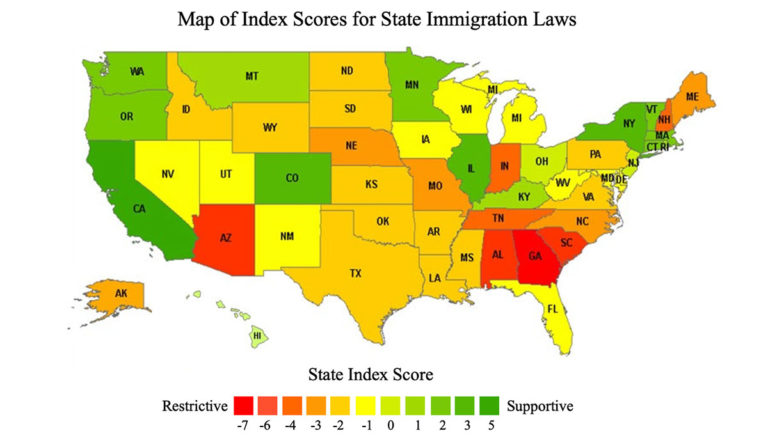Integration Walls
Researchers examined state and local laws throughout the U.S. and determined where these laws are more or less supportive of immigrants.

Read Time: 2 minutes
Published:
You hear the stories of ICE detention centers, deportation raids and asylum-seekers denied entry. It seems to all boil down to one sentiment: The United States does not like immigrants. More specifically, the United States does not like Latinx immigrants.
Federal immigration laws create news headlines, but state and local laws deserve more attention. State authorities and their employees have power over the wellbeing and health of immigrants, irrespective of federal policy. State laws dictate the daily lives of immigrants: Can you get a driver’s license? Rent a house? Have access to medical care?
Rhodes and team did a policy scan of state and municipality laws. The resulting state policy index map above shows wide variation; the higher the number and darker the shade of green, the more supportive state laws are toward immigrants. Across the country, only 13 states have a positive index score of 1 to 5. Laws supporting immigrants most often focus on access to health care and higher education. For instance, a positive health care law could provide undocumented immigrants health insurance through Medicaid using state funding. Currently only six states and Washington D.C. have such a program, with eligibility limited to children.
The study found that 41 states have laws restricting immigrants from obtaining official identification cards, and 28 states restrict the ability to get a driver’s license. These laws require strict documentation, including a Social Security number. Studies have found that laws supporting undocumented immigrants, often Latinx, in obtaining driver’s licenses improves healthcare access for their children.
Not having a driver’s license or government identification greatly reduces a person’s ability to interact with society. Identification is required to open a bank account, rent a house, access community resources such as food banks and vote. Supportive laws are indications of respect for our newest neighbors.
Databyte via Rhodes SD. Mann-Jackson L. Song EY. Wolfson M. Filindra A. Hall M.. Laws and Policies Related to the Health of US Immigrants: A Policy Scan Health Behav Policy Rev. 2020 Jul: 7(4): 314-324



